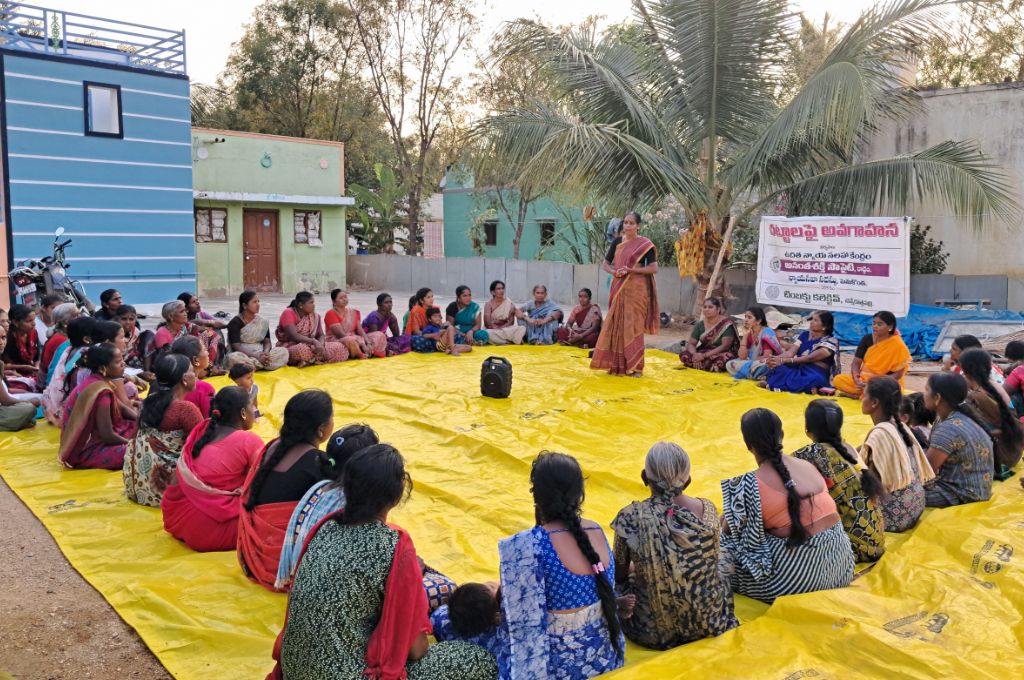
In 1992 I joined Ananthasakthi, a mutually aided thrift cooperative society promoted by the Timbaktu Collective in Sri Sathya Sai district (formerly Anantapur). I joined as a village-level sangha (group) member, and today I am a board member of the cooperative. I am also the vice president of Mahasakthi Federation, a collective of four thrift cooperatives with a net worth of INR 55.17 crore (FY 2023–24) and a membership of 32,000 women. I am not literate, but that has not stopped me from understanding money and its capacity to create change.
Earlier, loans taken by the members paid for weddings, farm inputs such as seeds and fertilisers, or a motorbike for a son. Today, half the loans are for small businesses that our members run. They also borrow money to buy land, construct or repair a house, or fund a child’s education. Many of the women are now confident risk-takers when previously they were nervous about engaging with money. These shifts are mainly due to a practice called loan counselling provided by the cooperatives.
This is how it works. When a member wants to borrow a loan, she first discusses it with her sangha, whose members stand as guarantors for one another. While no collaterals are sought, her ability to repay is assessed by fellow members: Has she borrowed and repaid loans before? Can family members pay it off if she can’t? Does she receive a pension?
The loan applicant is asked what she intends to do with the money and how she will repay it. The sangha helps her think through the plan. For example, they may suggest that instead of borrowing INR 1.5 lakh for her daughter’s wedding, she invest some of the money in assets such as gold. If she wants to open a sari shop, they may point out that the village already has several sari shops; perhaps she could consider another business.
This inquiry initiated by the sangha leader is the first level of risk assessment. They also help her think about her agency and autonomy. If she is borrowing for a new house or to purchase land, will she be the co-owner of the property? Will she have more say in decision-making? These questions make the women contemplate their position within the family and help the family, in turn, see the woman as a contributor to their economic well-being.
The next level of counselling and risk assessment is conducted by the cooperative’s board members who, while asking a similar set of questions that help the applicant think through her need for the loan, also explain the interest rates and terms of repayment.
While formal counselling is undertaken by the board, advice on how to best utilise the money is sometimes obtained in the waiting room itself, through other applicants who discuss what they intend to do with their loans.
After a woman has secured the loan, her sangha leader checks in on her progress. Has she used the funds for the purpose they were borrowed? Does she find it difficult to pay the instalments? What further assistance would she like?
This culture of community support and advice has made the women bolder with their financial plans. Mutual trust among the members and a sense of ownership towards the programme has also helped maintain a high repayment rate, making the women more credit-worthy and allowing them to apply for more loans to build their businesses. With the financial security they now enjoy, their status in the family and society has grown—a return on investment they value above everything else.
K Ramalakshmma is the vice president of Mahasakthi Federation, a collective of four women’s cooperatives.
—
Know more: Read about how group loans are pushing some people into a cycle of debt and social exclusion in rural Rajasthan.
Do more: Connect with the author at info@timbaktu.org to learn more about and support her work.